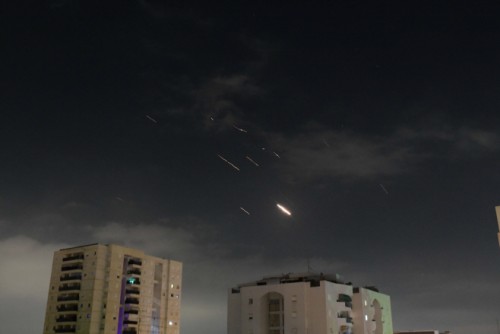 |
| Israel’s defense system intercepts missiles and drones from Iran on April 14, 2024./ Source: Xinhua, Yonhap news |
AsiaToday reporters Choi Hyo-geuk & Hong Sun-mi
Iran unleashed a barrage of missiles and drones on Saturday, targeting Israel in retaliation for last week’s suspected Israeli strike on its consulate in Damascus that killed seven officers of Iran’s Revolutionary Guard Corps.
This marks the first-ever direct attack by Iran on Israeli territory since the establishment of Israel in 1948, representing a watershed in the “shadow war” between Israel and Iran.
According to major foreign media outlets including the New York Times on Sunday, Israel used a multi-layered defense shield including Iron Dome and the Arrow 3, to block Iran’s more than 300 drones, ballistic missiles and cruise missiles fired at its territory, leaving little damage. Israeli Prime Minister Benjamin Netanyahu called up a war cabinet consisting of three members, including Security Minister Yoav Gallant and Minister Benny Gantz, to formulate a decision on how to react to Iran’s military response, CNN reported citing Israeli officials.
Iran also immediately issued a statement warning Israel of a larger attack on its territory if it retaliates against Tehran’s attacks, raising concerns in the international community that the conflict between the two sides could turn into the 5th Middle East War. Besides, if Iran blocks the Strait of Hormuz, a key export channel for oil-producing countries in the Middle East, it is expected to have an adverse impact on the global economy.
As the escalation of the Middle East War is feared to deal a fatal blow to global security and the economy, U.S. President Joe Biden is known to have promised to support Israel and provide security support, but clearly expressed his opposition to Israel’s counterattack on Iran. CNN reported that Biden drew the line that the U.S. would not participate in any offensive operations against Iran and will not support such operations.
Meanwhile, South Korean President Yoon Suk-yeol on Sunday presided over an emergency meeting to discuss the economic and security impact of heightened tensions in the Middle East following Iran’s strikes.
#Iran #Israel #attack
Copyright by Asiatoday
Most Read
-
1
-
2
-
3
-
4
-
5
-
6
-
7





















